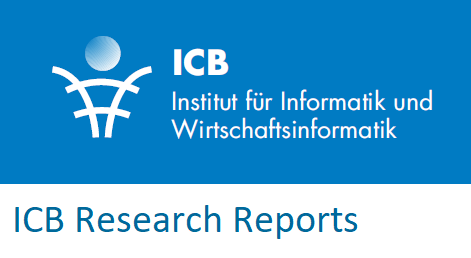Entwicklung und Stand der Disziplinen Wirtschaftsinformatik und Information Systems : Interpretative Auswertung von Interviews: Teil III Ergebnisse zur Wirtschaftsinformatik
Zur Rekonstruktion der Entwicklung und des Status der Disziplin Wirtschaftsinformatik (WI) wurden sechs Interviews mit namhaften Forschern und Zeitzeugen der WI durchgeführt. Dieser Forschungsbericht enthält die Interpretation der zugehörigen Interviewtranskriptionen und präsentiert die Ergebnisse entsprechend der thematischen Strukturierung des Interviewleitfadens. Er betrachtet dabei u. A. die Gründung der Disziplin, typische Forschungsmethoden und -gegenstände, die Entwicklung der Lehre und die Bedeutung der Praxisorientierung. Es wird dabei deutlich, dass die WI von den befragten Wissenschaftlern als durchaus erfolgreiche Disziplin eingeschätzt wird. Die Sichtbarkeit der WI als eigenständige Disziplin in der Praxis und in der internationalen Forschung ist jedoch offenbar eher gering. Kennzeichnend ist – nach der Einschätzung der Befragten – weiterhin die insgesamt zurückhaltende Diskussionskultur bzgl. geeigneter Forschungsmethoden und eines gemeinsamen visionären Forschungsziels. Die geführten Diskussionen weisen weiterhin darauf hin, dass die dedizierte Praxis- und Gestaltungsorientierung das Profil der WI prägt.
In order to reconstruct the development and status of the Information Systems (Wirtschaftsinformatik, WI) discipline in German speaking countries six interviews were conducted with renowned WI researchers in Germany and Austria. This report provides an overview of the interpretive research results based on the interview transcripts. The results are presented according to the topical structure of the interview schedule, including the foundation of the discipline, typical research methods and subjects of research, the development of teaching, and the role of relevance to practice. The results indicate that the WI discipline perceives itself as a successful discipline. However, the visibility as a distinct discipline in the eyes of practitioners and the international research community seems to be rather limited. Most interviewees agree that a rather limited culture of debates on appropriate research methods and a common visionary goal of research are typical for the WI discipline. The discussions indicate that the prominent role of relevance to practice and design oriented research approaches have shaped the field.
Vorschau

Zitieren
Zitierform:
Lange, Carola (2006): Entwicklung und Stand der Disziplinen Wirtschaftsinformatik und Information Systems: Interpretative Auswertung von Interviews: Teil III Ergebnisse zur Wirtschaftsinformatik. In: ICB Research Reports. Online unter: https://nbn-resolving.org/urn:nbn:de:hbz:464-20180925-114510-9.
Zitierform konnte nicht geladen werden.
